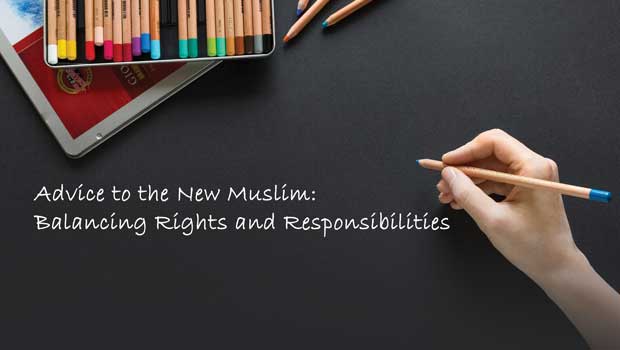Islam is a way of life which advocates balance and moderation. It is a way of life that calls the believers to strive for the fulfillment of individual rights, family rights, community rights, and general societal rights. Our dilemma is that in the current times, we find ourselves intoxicated with our individual selves and we neglect responsibilities — our family, community, and society rights. In order to shed some light on how to improve and lead a life of balance, I would like to address each of the four main points, insha’Allah.
The Individual’s Rights
Allah, the Exalted, says, “O you who have attained to faith, protect yourselves…” (Surah Tahreem, 66: 6). And in another verse, He (SWT) says, “Say: ‘Is it other than Allah I should desire as a lord while He is the Lord of all things?’ And every soul earns not [blame] except against itself, and no bearer of burdens will bear the burden of another. Then to your Lord is your return, and He will inform you concerning that over which you used to differ” (Surah Al Anam, 6: 164).
Allah, the Exalted, calls us to prioritize and focus on ourselves, develop ourselves, and be concerned about ourselves in this life and in preparation for the Day of Judgement and the Hereafter. In order to effectively prepare, one must follow Allah’s instructions and avoid the mistakes of the previous nations. The first instruction of Allah in the Quran is “Read”! Therefore, the first and most fundamental aspect of our personal development is the seeking of knowledge that nourishes our souls and constantly brings us closer and closer to our Lord. The primary text, of course, in our seeking of knowledge is the Quran. Shaykh Abdullah Shinqiti has said, “Befriend the Quran you will never go astray.”
Here are five tips for effectively seeking knowledge:
1. Have a mentor, someone who will guide you, who will analyze your level of knowledge and advise you what to start with in your process of learning — what book, what subject, and what institute or individual to study with. The Quran says, “And before you [Muhammad], also the messengers We sent were but men, to whom We revealed [Our message]. So ask the people of the message if you do not know” (Surah Nahl, 16: 43).
2. When you buy a book, focus on learning and digesting the knowledge it contains. And then strive to put that knowledge into practice. Build upon your knowledge base slowly and progressively.
3. Strive to learn Arabic. It is the gateway to an endless domain of knowledge. It is a lifetime investment. Allah (SWT) says in the Quran, “Indeed, We have sent it down as an Arabic Quran that you might understand” (Surah Yusuf, 12:2).
4. Perfect the basic requirements: Learn surah Al-Fatihah (Shaykh Mamdouh Mahmoud has videos on YouTube). Learn to make wudu properly, perfect your prayer, and make your prayers meaningful. With regard to surah Al-Fatihah, Ubadah bin As-Samit reported Allah’s Messenger (pbuh) as saying, “Whoever does not recite surat Al-Fatihah in his prayer, his prayer is invalid” (Bukhari). Also, Abu Sa’ad ibn Al-Mu’alla narrated the Apostle (pbuh) of Allah as saying, “…I will teach a surah which is the greatest surah in the Quran before you leave the Masjid.” Then he took hold of my hand and when he intended to leave [the Masjid], I asked him, “Did you not say that you would teach me a surah which is the greatest surah in the Quran?” He replied, “Yes. It is [the surah commencing with], ‘All praise and thanks are due to Allah.’ It is the seven oft-repeated verses [surah Al-Fatihah] and the great Quran that has been given to me” (Ahmad).
With regard to wudu, Abu Umamah narrates that the Prophet (pbuh) said: “Whoever stands up to perform his wudu, intending to offer salah, then cleans his hands, the sins of his two hands fall away with the first drop of water. Then, when he rinses his mouth, and draws water into his nose and expels it, the sins of his tongue and two lips fall away with the first drop of water. Then, as he cleans his face the sins of his hearing and seeing fall away with the first drop. Then, when he cleans his two arms including the elbows and his two feet including the ankles, he becomes free of all his offenses and sins, just as he was the day his mother gave birth to him.” He (then) said, “When he stands for salah Allah elevates his position and if he [merely] sits [without standing for salah] even then his sitting is free of sins” (Musnad Ahmad).
As to making your prayer meaningful, consider the following Quranic verse: “Recite, [O Muhammad], what has been revealed to you of the Book and establish prayer. Indeed, prayer prohibits immorality and wrongdoing, and the remembrance of Allah is greater. And Allah knows that which you do” (Al-Ankabut, 29: 45). Strive to observe the prayer in its proper time, review the steps of prayer, perform each step in a state of calmness, and reap the benefits of each step by striving to learn which phrases of praise are said and their meaning. Don’t just learn them in Arabic without understanding what you are saying. Learn both the Arabic as well as the translation/meaning, and do so step by step. The prayer is a lifelong connection with one’s Lord; therefore, one should strive to continue learning in a gradual process about the fiqh of salah from books recommended by one’s mentor.
5. Find a companion who will partner with you in the process of learning, either in your local Masjid or neighborhood. One should look for someone who is positive-minded and intent on learning. Choose a partner who is humble, and respectful of the scholarly tradition in Islam. Avoid anyone who approaches the seeking of Islamic knowledge with an attitude that conveys doubt or cynicism, or is prone to questioning or refuting points simply because of him or her having an argumentative nature. Life is short; strive for that which nourishes your soul and don’t waste time.
The Family’s Right
Allah, the Most High, says, “Worship Allah and associate nothing with Him, and to parents do good, and to relatives, orphans, the needy, the near neighbor, the neighbor farther away, the companion at your side, the traveler, and those whom your right hands possess. Indeed, Allah does not like those who are self-deluding and boastful” (Surah Nisa, 4:36). Allah instructs us to worship Him and then to be good
to parents and to maintain family ties. One has a responsibility as a son to be the best son, for the sake of Allah. As a husband, one should strive to emulate the beautiful teachings of Muhammad, the Messenger of Allah, and his treatment of his wives. As a parent, one must strive to be the best father, striving to be like the Messenger of Allah; and our mothers should strive to be the best of mothers, striving to be like the Mothers of the Believers. Always remember this verse: “So be mindful of Allah as much as you are able” (Surah Taghabun, 64:16).
It is also the right of the spouse and children to be supported financially by the husband. Some men who pursue Islamic knowledge in a serious way, think they will land a paying position, such as imam, within the Muslim community. That may or may not be the case, and therefore, a man should strive to pursue a career that provides financial stability for the family. A stable career also allows one to donate for the sake of Allah and to fund dawah and social justice projects. The pursuit of Islamic knowledge is a lifelong endeavor; it should, however, never be the cause for neglecting other responsibilities.
The Community’s Right
A community of believers strives to translate faith into action. They encourage one another in commitment to the truth and encourage one another to practice patience. Allah says, “By time, Indeed, mankind is in loss, except for those who believe and do righteous deeds and advise each other to truth and advise each other to patience” (Surah Al Asr, 103:1-3). A community of believers strives selflessly, in unity, seeking to please Allah.
This community understands the gravity of division within the ranks of the believers. Allah says, “And hold firmly to the rope of Allah all together and do not become divided. And remember the favor of Allah upon you – when you were enemies and He brought your hearts together and you became, by His favor, brothers. And you were on the edge of a pit of the Fire, and He saved you from it. Thus does Allah make clear to you His verses that you may be guided” (Surah Al Imran, 3:103). Given the importance of unity, a Muslim must strive to support and enhance that unity – through participation in masjid affairs and events, through volunteering, financial support, being a good role model for others in the community, especially the young people, and in every other way he can.
The Society’s Rights
A Muslim is meant to be beneficial to society, to be concerned about the well-being of all its members. This includes being friendly with neighbors, greeting them cheerfully, and being ready to assist them when needed, without expecting anything in return. This is part of practicing Islam, and by so practicing, one is teaching about Islam. The Quran says, “You are the best nation produced [as an example] for mankind. You enjoin what is right and forbid what is wrong and believe in Allah. If only the People of the Book had believed, it would have been better for them. Among them are believers, but most of them are defiantly disobedient” (Surah Al Imran 3:110). Allah sent Prophet Muhammad (pbuh) as a “mercy to all the worlds” (Quran, 21:107). Abdullah ibn Amr ibn Al A’as reported that the Messenger of Allah, peace and blessings be upon him, said, “Those who are merciful will be shown mercy by the Most Merciful. Be merciful to those on the earth and the One in the heavens will have mercy upon you” (Al-Tirmidhi).
In conclusion, my dear brothers and sisters, be balanced in regards to your individuality, your family life, your community, and society. The Prophet (pbuh) advised, “You have a duty to your Lord, you have a duty to your body, and you have a duty to your family, so give each one its rights” (Bukhari). He also taught us this supplication which we should make often: Allahumma inni as’alukal-huda wat- tuqa wal-‘afafa wal-ghina — “O Allah! I ask you for guidance, piety, purity [bashfulness about doing anything that displeases Allah], and independence and richness of self [with total reliance on Allah SWT]” (Muslim).





